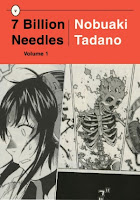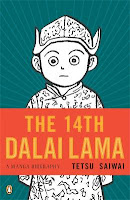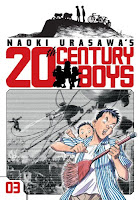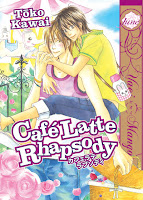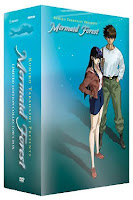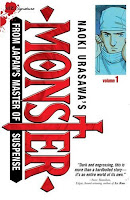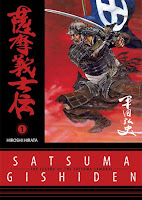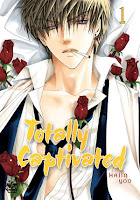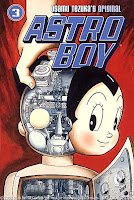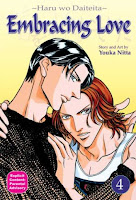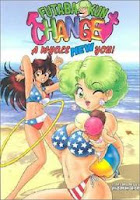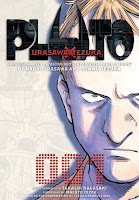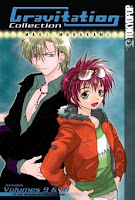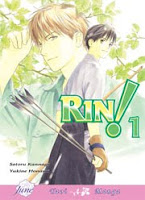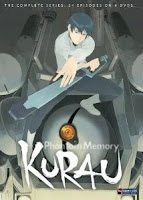My News and Reviews
I was away for most of last week and the beginning of this week in order to attend a conference for work. (NASIG for those of you who are curious.) I had a good time in St. Louis and learned lots of useful things, but this did mean I didn’t get as much manga and anime in as I would have liked. It also means that this week’s “My Week in Manga” is a bit late. Forgive me, but I needed to do laundry and sleep.
Fortunately for me, last week was one of my lighter weeks at Experiments in Manga. I announced the winner of the Oh, Ono! manga giveaway and manged to successfully schedule May’s Bookshelf Overload to post while I was away. I also added two new resources to the Resources page: The Fandom Post and Manga Bubbles. For your online reading enjoyment, I would like to bring your attention to Manga Artifacts: Pineapple Army by Kate Dacey over on The Manga Critic; it’s a much better look at the manga than my quick take below provides.
Quick Takes
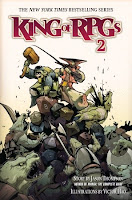 King of RPGs, Volume 2 written by Jason Thompson and illustrated by Victor Hao. The second volume of King of RPGs was one of my most anticipated releases for 2011. I loved the first volume so it didn’t come as much of a surprise to me that I loved the second as well. Most of the plot centers on MMORPGs and tabletop RPGs in this volume but there are still plenty of references other geek cultures, too. My favorite parts are when the role-playing insanity bleeds over into reality. Shesh, more than ever, is the main focus of this volume. However, new characters are also introduced, including the noble gold farmer Baijin Gangshi who I fairly adored. I really hope to see more volumes of King of RPGs; it’s a riot.
King of RPGs, Volume 2 written by Jason Thompson and illustrated by Victor Hao. The second volume of King of RPGs was one of my most anticipated releases for 2011. I loved the first volume so it didn’t come as much of a surprise to me that I loved the second as well. Most of the plot centers on MMORPGs and tabletop RPGs in this volume but there are still plenty of references other geek cultures, too. My favorite parts are when the role-playing insanity bleeds over into reality. Shesh, more than ever, is the main focus of this volume. However, new characters are also introduced, including the noble gold farmer Baijin Gangshi who I fairly adored. I really hope to see more volumes of King of RPGs; it’s a riot.
 Pineapple Army written by Kazuya Kudo and illustrated by Naoki Urasawa. I primarily picked up Pineapple Army because of Naoki Urasawa’s involvement with the manga. In Japan, the series ran for eight volumes. You wouldn’t know this by looking at Viz’s single volume edition, though—it collects ten chapters selected from throughout the original series. They mostly stand alone, though I suspect there may be some recurring characters that I would have liked to get to know better. I’d like get to know the protagonist Jed Goshi better, too. I happened to particularly like his beefy character design and found his personality to be appealing as well. It will probably never happen, but I wouldn’t mind the rest of this series available in English.
Pineapple Army written by Kazuya Kudo and illustrated by Naoki Urasawa. I primarily picked up Pineapple Army because of Naoki Urasawa’s involvement with the manga. In Japan, the series ran for eight volumes. You wouldn’t know this by looking at Viz’s single volume edition, though—it collects ten chapters selected from throughout the original series. They mostly stand alone, though I suspect there may be some recurring characters that I would have liked to get to know better. I’d like get to know the protagonist Jed Goshi better, too. I happened to particularly like his beefy character design and found his personality to be appealing as well. It will probably never happen, but I wouldn’t mind the rest of this series available in English.
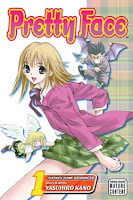 Pretty Face, Volumes 1-6 by Yasuhiro Kano. It’s a ridiculous premise—Masashi Rando, high school karate champion, is nearly killed in a terrible bus accident. In the process of recovery, his plastic surgeon gives him the face of the girl he has a crush on since he only had her photo as a reference. Or something like that. Oh! And his crush just happens to have a missing twin sister, so Rando takes her place. Perhaps not too surprisingly, there is plenty of fan service, especially in the first few volumes although it does carry through the entire series. Narrative-wise, Pretty Face is very episodic and somewhat directionless, but there were a few moments here and there that made me genuinely laugh out loud.
Pretty Face, Volumes 1-6 by Yasuhiro Kano. It’s a ridiculous premise—Masashi Rando, high school karate champion, is nearly killed in a terrible bus accident. In the process of recovery, his plastic surgeon gives him the face of the girl he has a crush on since he only had her photo as a reference. Or something like that. Oh! And his crush just happens to have a missing twin sister, so Rando takes her place. Perhaps not too surprisingly, there is plenty of fan service, especially in the first few volumes although it does carry through the entire series. Narrative-wise, Pretty Face is very episodic and somewhat directionless, but there were a few moments here and there that made me genuinely laugh out loud.
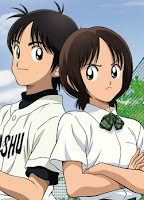 Cross Game, Episodes 17-22 directed by Osamu Sekita. So, I still don’t really care about baseball all that much, but I do care about the characters of Cross Game tremendously. And since they care about baseball, I find myself at least interested in what is happening and cheer them on in their efforts. I’ve been very happy with how the characters are developing. I’m particularly fond of Azuma who turns out to be much more complicated person than he initially appeared. I’m also interested in seeing where the newer characters, like Mizuki and Azuma’s older brother, go. I’ll definitely be watching more of this series even if I don’t end up picking up more of Adachi’s original manga.
Cross Game, Episodes 17-22 directed by Osamu Sekita. So, I still don’t really care about baseball all that much, but I do care about the characters of Cross Game tremendously. And since they care about baseball, I find myself at least interested in what is happening and cheer them on in their efforts. I’ve been very happy with how the characters are developing. I’m particularly fond of Azuma who turns out to be much more complicated person than he initially appeared. I’m also interested in seeing where the newer characters, like Mizuki and Azuma’s older brother, go. I’ll definitely be watching more of this series even if I don’t end up picking up more of Adachi’s original manga.

